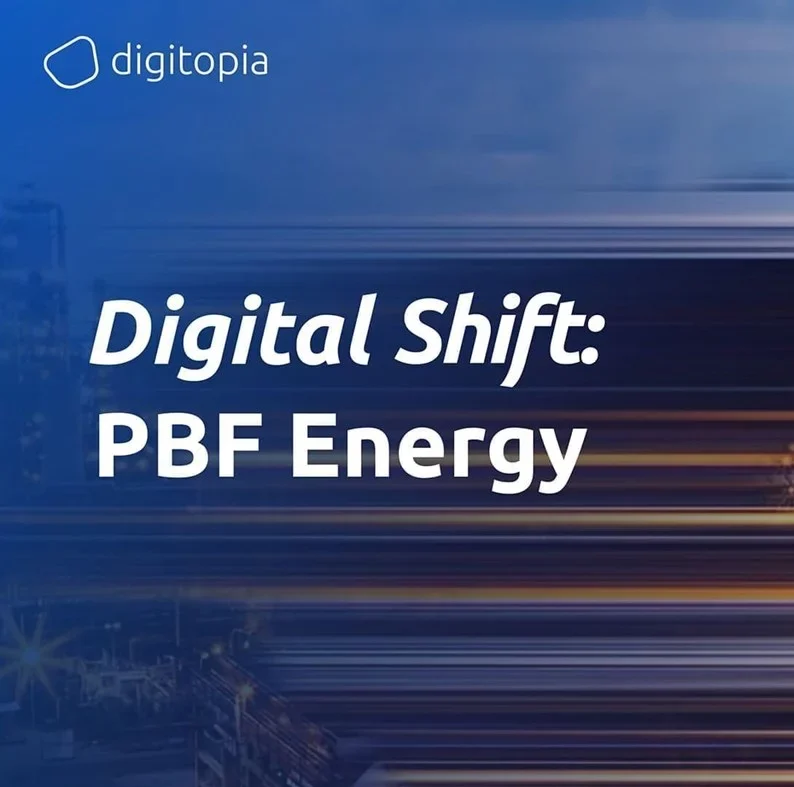
Refining Its Digital Capabilities: PBF Energy Consolidates Core Business
In our Digital Shift series, we showcase companies that transform their business through digital transformation. This month, we shed some light on PBF Energy – an independent incumbent in downstream Oil & Gas sector that is driven provide extensive spectrum of oil products with flexible feedstock processing capacity.
PBF Energy is a east-coast US-based refinery & oil produce logistics company. Established in 2008 in merger with Petroplus Holding and two private equity companies Blackstone Group and First Reserve. The refining company achieved $24.51B revenue in 2020. The company operates 6 refineries across US in 5 locations processing light, sweet, sour and heavy crude to provide white and black oil products with high Nielson index operation serving the US market.
PBF has achieved 123.0% growth in earnings per share (EPS) within the last 5 years (2014-2019). This growth is 12 times the Fortune 500 median from the same period (%9.9). The firm kept its resilient growth among its peers during expansion and aggressive acquisition strategy till 2016 and consolidation focused strategy after 2015 in heavily competitive downstream market.
Differentiation from the Industry
PBF has a focused strategy as an independent downstream player to enable flexible feedstock options and to provide high demand of energy fuel products in US domestic market. In the green boom period after 2010s large investments and incentives has been realized in global energy market. This resulted a shift in majority of downstream players in global landscape to change gears towards petrochemical or light/green fuel oriented operations. Established during the disruption period of downstream oil sector, PBF Energy decided to pave its own way to double down on heavy and light fuels and not following the footsteps of its peer in Asia Pacific and Europe market. To compete in a highly consolidated oil produce energy fuel market as an independent player, PBF Energy required operational excellence, financial diligence to keep continuous production of high quality and cheap commodity products.
As part of our focus period between 2014 and 2019, PBF Energy already acquired 2 large refineries from international players such as Valero and ExxonMobil. The company was along its consolidation and modernization of core operations as well as newly acquired facilities. Digital capabilities played a key role in directing the company for the long-term success and profitable operations.
The Digital Edge
The digital focus of PBF lies in three core areas of its operation: Procurement, commercial operations, and financial governance. PBF observed the needs and requirements of its success with highly aggressive inorganic growth strategy relied on its ability to manage and turn around acquired operations as fast and reliable as possible to profitable and stable operations. The secret for the enablers resided in financial reconciliation, rapid realizations, and competitive procurement operation for very commoditized product portfolio.
Procurement Performance:
PBF realized the refining operation was a high Capex oriented operation that required the support of third-party involvement throughout the operation cycles. The third party involvement ranges from contractors, engineering companies to technology vendors with continuous effort in the field and backbone of the operations in downstream sector. PBF tackled the initial low hanging fruit for their operation to take control of. This item was technology procurement service management platform for them to scale their efforts and structure the efforts to pave the way for better governance of project execution and better selection of right solutions & vendors for its needs. Essentially the Technology Selection Management (TSM) platform enabled PBF to from guiding coalition within its internal stakeholders from different business functions to rapidly create detailed requirements that fit the agenda of available vendors and technology solutions to streamline the procurement from the ground zero.
Companies focus on elevating the patient journey with its services, digital solutions and medical equipment is the primary source of its digital transformation success. The company also sustains these initiatives and reflects the success into balance sheet through rigorous digitalization in its cost center operations to scale down its OpEx while maintaining the quality felt by customers high.
Commercial Targeting:
PBF utilized the available domestic high demand for white and black oil products in US and pushed its products as unbranded to capture large B2B deals to fuel its operations and growth over the past years. B2B driven industrial commercial operations benefit heavily from the few amounts of clients with big tickets in bulk sales. This has advantages to manage the daily operations (especially with manual effort) in comparison to B2C oriented sectors where client base usually composes of a minimum of couple hundred thousand. The benefit can also turn into a huge defect for the B2B industrial operations to falsely induce confidence to continue manual commercial operation in the age of digital era. The PBF realized their potential pitfalls fast enough to structure commercial application teams to equip them with advanced analytics and digital tools to target and serve customers with customized and digitalized workflows. This enabled the company to differentiate from its large International Oil Company (IOC: BP, Shell, ExxonMobil, etc) extremely well to provide speed and transparency towards their clients with highly digitized commercial operation.
Financial Due-Diligence:
PBF disclosed very few news or updates of condition of its financial governance structure and performance over the years. However, one thing is certain, the results of the financial resilience observable in many of its publicly disclosed updates. Since the company is founded through merger of 2 seasoned private equities in this field, the company benefited from the board capability towards highly optimize and rapid financial transparency and consolidation. These all enabled through highly integrated and sophisticated financial tools at the disposal. The company’s inorganic growth strategy resulted in 3 large acquisitions, 1 large divestment and 1 large operational turnover maneuver to counteract the short-term demand effect of COVID pandemic. The company disclosed the financial impact of these bold actions rather accurately and rapidly which is observable through their annual reports and increased interest of investor support over a mid-term period of last 5 years. The company outperformed in terms of acquisition success and cost reduction efforts at large scales so far in their short operational history. The luck plays a very low portion in this success story since the business sustainability and continuous performance usually resides in large incumbents’ ability to digitalize and transform their operations compatible with the current era competition.
Incumbent stance on COG Journey
Founded during the aftermath of financial debt crisis and from ground up raised to be a competitive player in a very old and consolidated sector of downstream Oil & Gas, PBF Energy emerged as a both investor favorite with its high EPS growth and supplier of choice among its customer base with its reliable operations.
Even with a very conventional strategy around the operations in a highly commoditized market, PBF proved that digitalization around a conventional strategy still proves the be a formula for success in the competitive market. Incumbents of their sector should always ask themselves the question whether it is a risk worth taking to rely on manual labor to stay on edge of their market when many of the incumbents already reaping the fruits of their long-term vision to digitally transform their approach to the industry.

